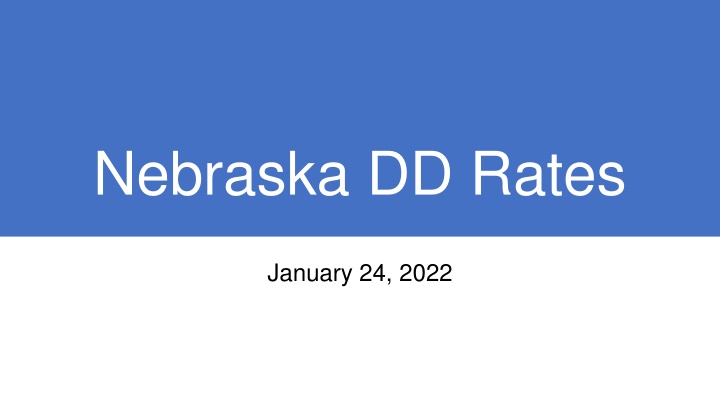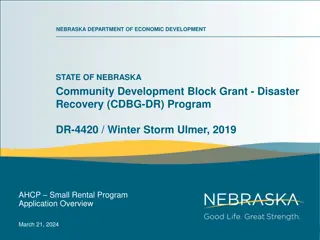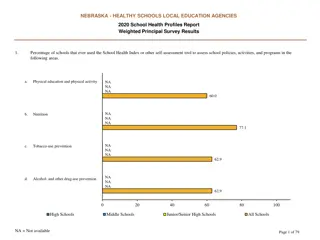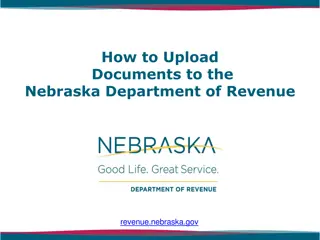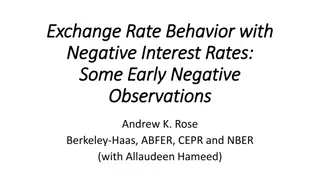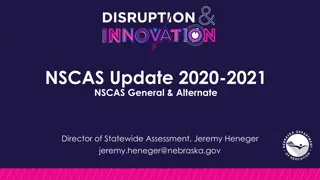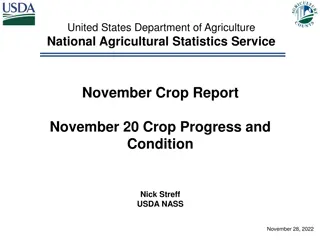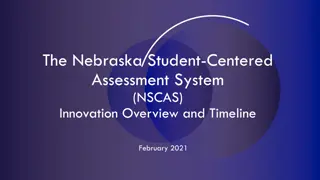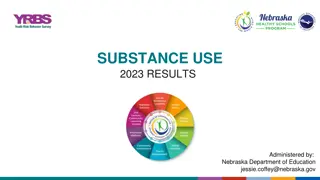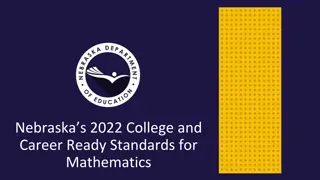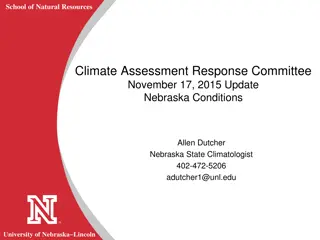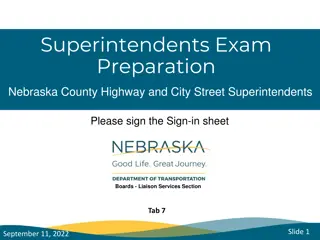Nebraska DD Rates
Navigate through the latest Nebraska Developmental Disability rates effective from January 24, 2022. Stay informed about the updated rates and changes in the DD system to make well-informed decisions and understand the financial aspects related to developmental disabilities in Nebraska.
Download Presentation

Please find below an Image/Link to download the presentation.
The content on the website is provided AS IS for your information and personal use only. It may not be sold, licensed, or shared on other websites without obtaining consent from the author.If you encounter any issues during the download, it is possible that the publisher has removed the file from their server.
You are allowed to download the files provided on this website for personal or commercial use, subject to the condition that they are used lawfully. All files are the property of their respective owners.
The content on the website is provided AS IS for your information and personal use only. It may not be sold, licensed, or shared on other websites without obtaining consent from the author.
E N D
Presentation Transcript
Nebraska DD Rates January 24, 2022
DD providers in Nebraska need a 30% increase in rates to maintain adequate service levels. DD Providers are suffering from unprecedented losses and a lack of state support. 5 of Nebraska s largest providers combined financial data for Q3 2021 compared to Q3 2019 and showed a net margin loss of 12%. These 5 providers made a combined profit margin of 2.6% in Q3 2019. Q3 2021 showed a net loss among these providers of 10.6%. BSDC compensation rates increased 20% for technicians in 2020. The 30% increase would allow DD providers to increase their direct support payment rates alongside BSDC and make up for the net margin loss.
No additional state support has been passed to providers. Providers no longer have the flexibility for service provision afforded under Appendix K. The Division for Developmental Disabilities (DDD) increased provider rates by 15% through CMS s Appendix K. DD Support During COVID-19 March 2020-September 2020 July 2021-December 2021 October 2020-June 2021 January 2022-June 2022 Governor Ricketts announced 15% increase for DD providers for the last half of SFY 2021-22. DDD announces the end of enhanced rates through a stair-step approach beginning in October 2020 through December 2020. After provider input, DDD retroactively increases rates from January-June 2021 (paid in August 2021).
Provider Financial Data Jul Sep 2019 Jul Sep 2021 Revenues HHS Revenue (1915c DD Waivers): Other Service Revenue: Total Revenue: Consolidated Income Summary $41,434,989 $1,873,860 $43,308,849 $36,825,398 $1,268,229 $38,093,627 Sample of five providers (representing 45% of all payments made by HHS for DD services) Expenses Salaries and Wages Employee Benefits and Taxes Travel/Transportation Supplies Occupancy Equipment Contracted Services (non-SLP) Contracted Services (SLP) Other Operating Expenses: Total Expenses: $20,101,746 $5,862,574 $751,690 $410,514 $2,698,457 $239,848 $1,168,837 $8,568,515 $2,362,625 $42,164,802 $19,192,109 $5,959,739 $579,965 $299,476 $2,641,494 $239,584 $1,060,039 $9,387,093 $2,754,745 $42,144,245 Comparing financial data for three months prior to the COVID-19 pandemic (July 1, 2019 to September 30, 2019 to the same period in 2021); intentionally using a time period after Appendix K financial assistance ended. Profit/(Loss) $1,114,047 ($4,020,618) DD providers operating margin fell by a staggering 12%, from 2.6% to -10.6% between the reporting periods. Margin: 2.6% -10.6%
Nebraska Spending on DD Services Program 424 State Expenses Since SFY 15-16, the amount spent on DD services has decreased. SFY 2015-16 state expenses: $155,466,547 SFY 2020-21 state expenses: $145,087,762 Source: DAS Budget Portal
Nebraska Spending on DD Services Program 424 State Expenses Over this six-year period, state spending on DD services has decreased 6.68%. DD Service Coordination expenses has increased 25.26% over the same period. Medicaid and Long-Term Care spending has increased 25.74% over the same period. Source: DAS Budget Portal
Nebraska Spending on DD Services Program 424 Total Expenses The number of people being supported using Program 424 funds has increased over this six-year period, while state spending has decreased. When accounting for inflation and increased census, the state of Nebraska s total spend on DD services (with federal matching funds) has decreased by 9.48% per person supported.
Nebraska Appropriations for DD Services Program 424 Appropriations State appropriations have decreased slightly through SFY 20-21. Appropriations were passed in 2021 to increase Program 424 for SFY 21-22 and 22-23. Instead, Program 424 has remained flat, and the DD census has increased. Source: DAS Budget Portal
Nebraska Appropriations for DD Services Program 424 Appropriations Money for DD services has been reappropriated for the past three state fiscal years. The Division of Developmental Disabilities (DDD) returned 6.3% of their SFY 20-21 appropriation to the general fund. If the 6.3% had been spent on DD services, it could have resulted in nearly $27 million for DD last year (after federal matching funds). Source: DAS Budget Portal
Current SFY Spending by DDD Program 424 Expenditures (through December 2021): Program 424 Current Year Spending $69,240,092 Percent of Appropriation Expended: 42.23% DDD is underspending their appropriation at a record rate. DDD will leave over $68 million on the table if their spending patterns do not change. Calendar Time Elapsed in SFY: 50.41% Total Underspend through Dec. 2021 (state funds only): $13,405,353 As of December, DDD has only spent 39.1% of available appropriations. SFY 21-22 Appropriations: $163,946,528 Projected SFY 21-22 DD Underspend (state funds only): Money given for DD services by the Appropriations committee is not being spent. $26,592,646 Total Projected SFY 21-22 Projected Underspend (with federal match): $68,621,548 Source: DAS Allotment Reports
DD providers in Nebraska need a 30% increase in rates to maintain adequate service levels. DD Providers are suffering from unprecedented losses and a funding model that has not kept pace. State appropriations for DD services are being returned to the general fund and are not maximizing federal resources. DDD reappropriation/lapsed funds totaled over $10.2 million last year. Adjusting for inflation, total DD cost per person receiving services is lagging by nearly 10%.
Supporting struggling DD providers meets the goals stipulated by SLFRF and ARPA. The Coronavirus State and Local Fiscal Recovery Funds (SLFRF) guidance by the US Dept. of Treasury outlines four basic uses of funds: lost public sector revenue, response to far-reaching public health and negative economic impacts of the pandemic, provide premium pay for essential workers, and investment in particular infrastructure. DD Providers check 3 of the 4 boxes for ARPA use. Providers were broadly and severely negatively impacted by the COVID-19 pandemic through revenue loss, increased costs, and changes to the way services are delivered. On average, DD providers across Nebraska s starting pay for front-line, essential workers is $13.27 per hour, with providers reporting the need to hire 30% of their workforce. Premium pay for these jobs is critical. Supporting LB 1172 will ensure Nebraska is in alignment with guidance from the Department of Treasury and is making a significant investment in one of the industries most harshly impacted by the COVID-19 pandemic.
Supporting struggling DD providers meets the ARPA Eligibility Checklist DD services are medical services and behavioral health combined. Also, some of the most challenging people to support are often violent. With properly paid, experienced, appropriate staffing, we can help solve those issues. Providers are experiencing dramatic negative economic impact. Funding these requests will raise the incomes of people making low wages, will assist small businesses, non- profits, and impacted industries. LB 1172 would help providers build public sector capacity in providing services to people with developmental disabilities. Currently there are funded waitlist offers not being met due to provider capacity limits. Many providers were providing premium pay to front-line workers when the state was supporting DD provider rates. However, without knowing that LBs 1172 and 893 are passing, it is challenging to continue those premiums in the future.
DD providers in Nebraska need a 30% increase in rates to maintain adequate service levels. What can you do to stabilize and bolster DD services in Nebraska? Support LB 893, sponsored by Chairman Stinner, which increases the DD base appropriation by 15% for SFY 22-23. Support LB 1172, sponsored by Senator Hilkemann, which uses ARPA funds to adds 15% to provider-based services conducted by front-line employees for SFY 22-23.
